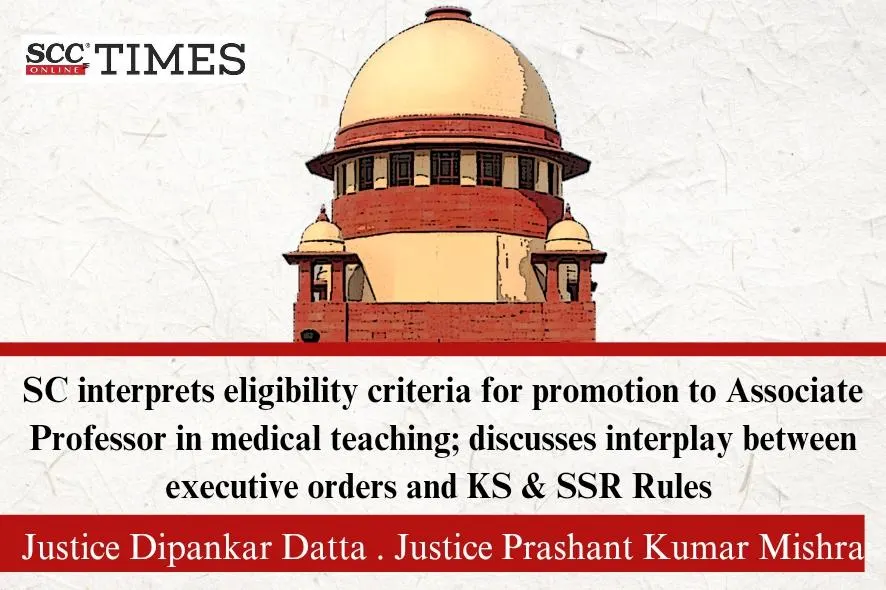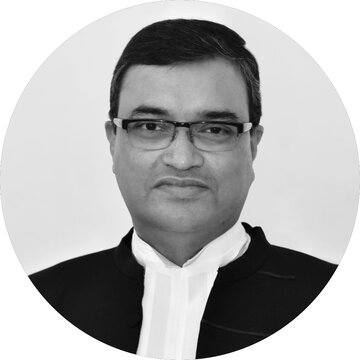Supreme Court: In a set of two civil appeals against the Kerala High Court’s decision, allowing the third respondent’s petition challenging the legality of the appellant’s promotion to the post of Associate Professor in Neurosurgery and setting aside the Kerala Administrative Tribunal’s order which dismissed the third respondent’s application under Section 19 of the Administrative Tribunals Act, 1985 in limine, the Division Bench of Dipankar Datta* and Prashant Kumar Mishra, JJ. allowed the present Associate Professor’s plea and dismissed the third respondent’s claim raising a challenge to the appellant’s promotion. The Bench set aside the High Court’s decision stating that the eligibility criteria for appointment on posts borne in Branch — I i.e. Administrative Cadre and in Branch — II i.e. Teaching Cadre, in the absence of recruitment rules framed under Article 309 of the Constitution, were provided by G.O. dated 07-04-2008 which is the executive order governing recruitment.
The Bench also reiterated that in the absence of rules, recourse to recruitment based on executive orders could be taken. The Bench said that even without examining whether the present Government Order (‘G.O’) dated 14-12-2009 had any application to the promotional appointment in question, it would be just and proper to focus on the requirements of G.O. dated 07-04-2008.
Background
The appellant was working as an Associate Professor in Neurosurgery under the Medical Education Service with the third respondent. The third respondent reached the said post by way of a Career Advancement Promotion (CAP) and the present appellant was promoted on regular basis. The third respondent’s case before the High Court was that career advancement promotion as an Associate Professor cannot be treated as a regular promotion. The grievance of the third respondent was that the appellant was promoted on a regular basis as Associate Professor without strictly complying with the mandatory procedures for effecting regular promotion inasmuch as his promotion was effected without convening a DPC for preparing a select list and also without assessing the eligibility of all the eligible candidates including the appellant, for being promoted as Associate Professor of Neurosurgery on regular basis.
The third respondent assailed the Tribunal’s order which upheld the legality of the promotion granted to the appellant and dismissed the application in limine.
While hearing the appeal, the High Court held that the drawing of the select list by the DPC was admittedly not based on the relevant rules. The High Court also held that the relevant aspects were not at all gone into by the Tribunal, hence it was liable to be interfered with and accordingly, set aside. Consequently, the promotion of the appellant to the post of Associate Professor was also set aside.
Analysis and Decision
The Court noted that at the time of occurrence of the vacancy, a GO dated 07-04-2008 providing qualifications for appointment in Branch — I i.e. Administrative Cadre and Branch — II i.e. Teaching Cadre, was in force. The discipline of neurosurgery was included under Head ‘C’ of Branch – II i.e. medical (super specialties). The categories of faculties covered by the said G.O. were (i) Professor, (ii) Associate Professor, and (iii) Assistant Professor. The Court also noted that for recruitment and appointment to the posts of Professor, Associate Professor, and Assistant Professor, the educational qualifications are same, and an aspirant must have a degree of M. Ch in Neurosurgery or DNB (Neurosurgery). Perusing the GO, the Court said that it could not be concluded that 5 years’ experience of physical teaching as an Assistant Professor after acquiring an M. Ch. degree is one of the requisite qualifications.
Further, perusing the Rule 10(a)(i) and Rule 10(ab) of the Kerala State & Subordinate Service Rules 1958, the Court said that the ‘Recruitment Rules’ is used in Rule 10(ab) as an alternative to Special Rules. Taking the colour from Rule 10(a)(i), ‘Recruitment Rules’ can be understood to mean and include government executive orders in cases where Special Rules are absent. The Court concurred with the Tribunal.
On dismissal of third respondent’s application in limine, the Court said that it deserved to dismissed so, the maxim expressio unius est exclusio alterius (whatever has not been included has impliedly been excluded) would apply. The Court pointed out that the G.O. used words “after acquiring postgraduate degree” for experience qua eligibility criteria for appointment of Director of Medical Education and Joint Director of Medical Education/Principals of Medical Colleges, i.e., posts in Branch — I i.e. Administrative Cadre. The Court underscored that if the executive intended that aspirants for the said post of Associate Professor, or, Professor were required to have physical teaching experience in the feeder posts for a specified number of years “after acquiring postgraduate degree”, it defies reason as to why the same qualification was not included for appointments on promotion to posts borne in Branch — II i.e. Teaching Cadre but included for the posts borne in Branch — I i.e. Administrative Cadre.
The submission by the third respondent that posts borne in the Administrative Cadre have responsibilities different from those borne in the Teaching Cadre, was insignificant primarily for the reason that insistence of physical teaching experience of a specified number of years with a particular postgraduate or super speciality degree would seem to be more required and demanding for appointment on posts in the Teaching Cadre rather than those in the Administrative Cadre. Thus, the Court held that the exclusion of the words “after acquiring postgraduate degree” was deliberate and conscious.
The Court also stated that —
“Although, normally, experience gained after acquiring a particular qualification could justifiably be insisted upon by the employer, there could be exceptions and the present case is one such exception. It is well settled that the intention of the rule framer has to be assessed on both parameters i.e. the words used and that of necessary implication. The requisite of post-qualification experience being present in Branch — I, and absent from Branch — II, necessarily implies that it was not a requirement for appointments on promotion to posts borne in Branch — II.”
Further, the Court added that in the matter at hand, as on the date of occurrence of vacancy i.e. 13-11-2012, the appellant had physical teaching experience of more than 5 years as Assistant Professor (he having joined on 11-01-2007). Hence, the High Court erred in placing reliance on Rule 28(b)(1A). Therefore, allowing the appeal, the Court set aside the impugned judgment and order of the High Court as unsustainable and restored the Tribunal’s decision.
CASE DETAILS
|
Citation: Appellants : Respondents : |
Advocates who appeared in this case For Petitioner(s): For Respondent(s): |
CORAM :









